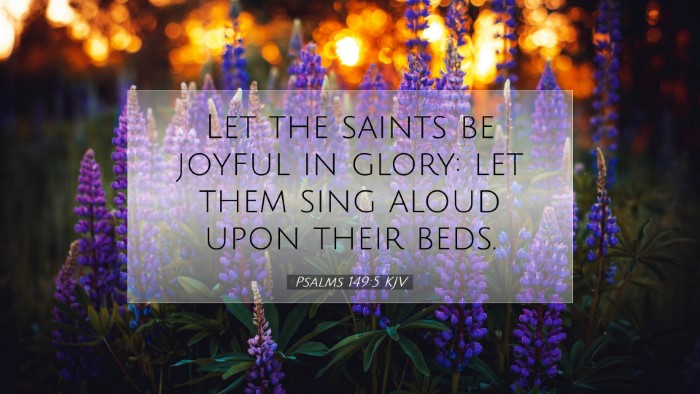Psalms 149:5 - Commentary Overview
Psalms 149:5 states, "Let the saints be joyful in glory: let them sing aloud upon their beds." This verse serves as an invitation to joy and worship, illustrating the state and activity of the saints in the glory that they possess through their relationship with God.
Contextual Understanding
The book of Psalms is a collection of hymns, prayers, and meditations that express the full range of human emotion towards God—from joy and praise to lament and anguish. Psalms 149 stands out as part of the final hallelujah psalms, which focus on the celebration of God's sovereignty and the joy of His people.
Theological Insights
- Joy of the Saints: According to Matthew Henry, the "saints" here refer to those who are set apart for God—believers who find delight not only in their earthly paths but in the eternal glories that await them. The "joyful" condition reflects their secure position in God's love and the hope of eternal life.
- Glory: Albert Barnes emphasizes the concept of "glory" in this context, suggesting it encompasses both the present blessings and the future promises of God. The saints experience a reflection of divine glory as they partake in God's goodness and truths, which leads to an intrinsic state of joy.
- Worship and Praise: Adam Clarke comments on the exhortation for the saints to sing aloud. This reflects an active response to God's glory—a necessary aspect of the believer's life. Singing, in this context, acts as an expression of gratitude and worship that spills over from the heart, even into the quietness of their own beds.
Practical Applications
This verse has profound implications for the daily lives of believers, particularly in fostering a lifestyle of worship and joy, even in moments of solitude.
- Joy in all Circumstances: The essence of joy, as mentioned in this psalm, suggests that believers should cultivate a continual sense of happiness and gratitude regardless of their situations. Pastors and leaders can encourage their congregations to find joy rooted in spiritual truths rather than external circumstances.
- The Importance of Worship: Worship is not confined to communal gatherings; believers are called to bring their praises into their private lives. This verse encourages individuals to engage in personal worship during quiet times, reinforcing the idea that worship can and should be a constant practice.
- Community of Saints: Recognizing others as "saints" helps engender a sense of community. Engaging in joyful practices together fosters unity among believers, allowing them to share in each other's triumphs and joys.
Interpretative Challenges
Despite its clarity, some interpretations of Psalms 149:5 may vary, especially regarding the nature of joy and the meaning of "beds." Scholars often discuss whether this signifies rest, sleep, or a metaphorical space where reflection and truth resonate.
- Literal vs. Metaphorical: Some may argue that this reference is more than mere comfort; it conveys a deeper experience of intimacy with God during personal reflection and prayer. The act of singing signifies a life lived in constant connection with God, not just during set times of worship.
- Cultural Context: Understanding the historical context of the psalm's original audience is crucial. The Israelites had a rich tradition of singing and worshipping during communal and individual moments, and the context emphasizes a joyous response to God's saving acts.
Conclusion
Psalms 149:5 invites believers into a deeper, joyful relationship with God that manifests in both communal and personal worship. The insights provided by respected commentaries help encapsulate the significance of joy in the life of a believer and the ongoing call to live in a state of praise. Both pastors and theologians are encouraged to teach and exemplify these truths, leading others toward a holistic life of worship and joy.


